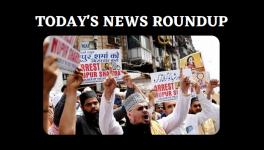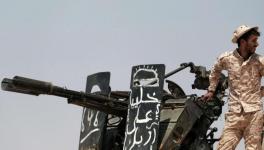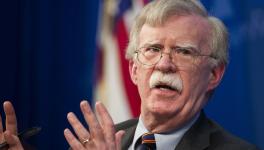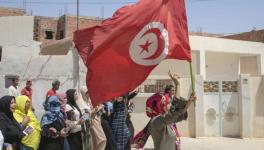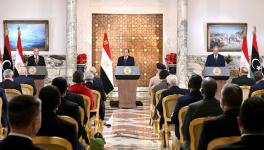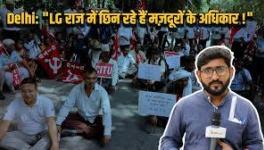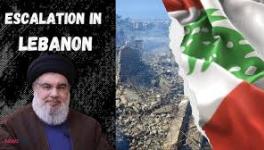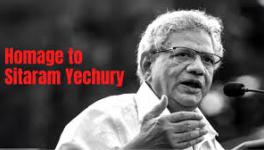Manchester Bombing: The Libyan Connection
Newsclick talked to Prabir Purkayastha on the recent Manchester Bombing. Salman Abedi, a young 22-year-old Libyan boy was found to be the suicide bomber. Prabir talked about the connection between Libya and the Manchester bombing, and about the recent massacre at the Brak al-Shatti, an airbase at Libya. He talked about the internal political situation in Libya. There are one set of forces in Libya who do not want it to be united again, and to get back control over its oil wealth. There are western powers who would like Libya to stay where it is - in a state of civil war.
Rough Transcription
Neha: Hello and welcome to Newsclick. Today we have with us, Prabir Purkayastha, founder editor of Newsclick. We are here to talk about the Manchester bombing. So Prabir, now that we know it was Salman Abedi, 22 year old young fellow from Libya who bombed himself and caused the death of 22 young people in Manchester. What do you think was the reason for that?
Prabir Purkayastha: Well it’s difficult to get into the minds of particular individuals but if you look at the process, it would perhaps be wrong to call him a Libyan in that sense because he was in U.K. for a very long time, his father was settled in U.K. but for all practical purposes they did recently go back to Libya after 2010, he seems to have gone back to Libya with his wife. So yes, we have a specific situation where a group of Libyans in Manchester seem to have been radicalized to over a period of time because this is how we are referring to what would be called Al-Qaeda forces, the ISIS, all of them are being referred to as radical though in essence they are not. But you really have these kinds of groups coming up and you can see that this has come up in France, this has come up in Belgium, it’s come up in Germany and all of them are then used by the west in different ways against what they dislike in West Asia, in this case North Africa and destabilizing certain regimes and then we have what’s called a blow back. Of course, the death of young people anywhere, all people for that matter is really unfortunate. But the point is, that we cannot lose sight of the fact that there is a war that has been unleashed by western powers in West Asia, in North Africa against regimes they don’t like. And they have used all kinds of instruments for their larger game of regime change. A lot of these people who they are using there then come back home and act essentially the way they do also in this country. So we had, Charlie Hebdo, we had for instance the bombing that we saw in Paris where the stadiums were attacked. We have also other musical events which took place in Paris which were attacked and now we have an event which was young people, young singer and that’s been attacked in this particular way. But I don’t think we should lose sight of the larger picture. That this particular group has probably implicated in this young man’s blowing himself up is also the group that U.K. intelligence agencies used earlier against Gaddafi and also after 2011 supported them in the various activities they were doing including of course the change of regime, killing Gaddafi and so on. So I think there’s a larger lesson we have to learn which unfortunately the media is not focusing on so people are not getting this part of the story.
Neha: There has also been a massacre at Brak Al-Shatti, an airbase in Libya. So this massacre, the attack on Manchester, do you think this is an impact of what are called the radical Islamist groups?
Prabir: Well it’s very interesting that the massacre you talked about has actually been blacked out in all the papers. The media hasn’t talked about it. It seems 74 people were killed; most of them were unarmed, there were civilians like cooks and other people. Even the airman who had been killed were unarmed were shot in the head, arms tied and so on. So this official toll has been from 74 to 150, we don’t know the numbers fully but nevertheless it’s really a large massacre. It has got absolutely no attraction in any news while Manchester becomes almost ubiquitous in the way it has been splashed about. But what are the links? The issue is that Libya has a situation of civil war. We have different parties testing for control of Libya and in some of these we have Al-Qaeda forces as well as ISIS forces on the one side. This particular case, the massacre seems to have been done by forces of the government which is being backed by the United Nations really by Western powers while you have what you call the General National Congress, the GNC which has its liberation and the Libyan National Army which is really the key element of the GNC which is the other side. Now the Libyan National Army is headed by Haftar. Haftar, as you might be aware, was a CIA asset who was brought into Libya to fight against Gaddafi who later on wanted Libya to be united and therefore played a role in unifying all sections and became person on grata of the west. It appears it wants Libya to be divided and therefore much more amenable to control by external powers and ultimately the oil company. They don’t want a united Libya which Haftar really wants and he believes that without militarily controlling Libya, one section controlling Libya, this cannot happen. So the government that the United Nations or the western powers back, it seems they have a whole bunch of forces which are Islamic, Islamists which have been a part of the Al-Qaeda earlier. In fact the Libyan Islamic fighters group which is the one, which this young man was supposed to be a part of; his father was very much a part of this particular group, involved in assassination attempts against Gaddafi, that seems to be also a part of this kind of formation. And let’s not forget, the Libyan Islamic fighters group has been delisted as a terrorist group by the United States. Now this is the complexity of the situation that you have these kinds of groups which are designated terrorists at one point of time or the other, then gets delisted, become close allies of either the UK against Gaddafi, or the US, against Gaddafi or against Bashar-Al-Assad and that then has what is called the familiar criteria of the blow back starting from Afghanistan and even earlier. So I think unless we are able to take a position where we try not to play this kind of narrow politics, a regime change in order to get or depose governments which you don’t like, I don’t think we are going to get very far. And this condition of armed attacks, massacres will continue.
Neha: The massacre Brak Al-Shatti and Manchester bombing, what are the kind of political forces right now in Libya who are trying to gain power; what is currently happening in Libya?
Prabir: Well it’s clear that the Libyan National Army under Haftar probably is the more dominant force and controls about two-thirds of the country, could be half, could be two-thirds of the country. This control is not complete. You have probably a very large number of militias by some estimate even 1700, that’s the number of militia active in Libya but Haftar is certainly the more dominant force in Libya today. The other part is the United Nations backed government, government of National accord that’s been talked about led by Sharaz. Now that government has an uneasy coalition with a whole number of forces including essentially Al-Qaeda and ISIS forces and trying to contest against the more dominant military forces, essentially Haftar. Now this is one part of it. The other part of it is that there’s an international also coalition that is shaping up with Egypt el-Sisi and with Russia also supporting Haftar. Don’t forget that Haftar was a CIA asset once upon a time. These forces are supporting essentially today, Haftar because they believe that the stability of the region demands that Libya returns as a unified state and they see the best bet in that as Haftar. So I think this is the way it is playing out today. That one set of forces do not want Libya to get united again, get back the control over its oil wealth, play a role that Gaddafi did in Africa which was supporting the organisation African States, giving it a certain semblance of Independence from Western powers. And you have the other side, the Western powers who’d like Libya to stay where it is, in a state of civil war if not bifurcated into small areas which they can dominate and then control its oil wealth. So I think we are seeing these are the forces that play in Libya and we hope that good sense will dawn on everybody that a situation of war, supporting different kinds of war forces, militias, it’s counterproductive because it leads to then the blowback taking place all across the globe including Manchester, Paris and in various parts of South Asia for example.
Neha: Thank you Prabir. That’s all the time we have today. Please keep watching Newsclick.
Disclaimer: Please note that transcripts for Newsclick are typed from a recording of the program. Newsclick cannot guarantee their complete accuracy.
Get the latest reports & analysis with people's perspective on Protests, movements & deep analytical videos, discussions of the current affairs in your Telegram app. Subscribe to NewsClick's Telegram channel & get Real-Time updates on stories, as they get published on our website.










